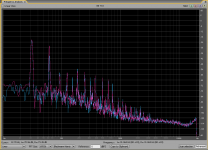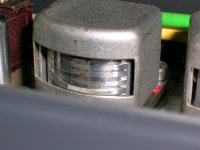Yes, the hiss is quite strong, and 15 secs in there is some non-musical noises, for about 5 secs, like someone pecking on an old typewriter - perhaps some of the pipe rank knobs being operated. There is music content throughout, it makes sense as a piece of composition - and you can hear the throbbing, or beating of the last chord(?) at the end of the piece.
The piece of music is the finale from Widors organ symphony no 6. It should have the walls and windows rattling 😉
Much better than that, dvv, 😉 - these running at full volume easily sound good at the other end of the house, and completely drown out other sounds, with the right material, nearby. Their biggest problem is very low energy reserves, with a modern, strongly compressed pop track they quickly run out of air, so just drop the volume back until the supplies can cope.TRANSLATION - SOME PC speakers will probably do a decent job of playing music at low levels you'd expect for one sitting near them, and for them placeed around a monitor. I haven't heard them, but doesn't mean they don't exist.
Subjectively, dynamic range is fine - like most cheap dynamic drivers the cones have to be driven hard for a while to get the best out of them, I find thrashing them with pop for a few hours gets everything nicely freed up, deeper and deeper soundstage can be extracted the longer they're firing ...PROBLEM - dynamic range at even normal levels. How much can you wreak out of a chip amp being fed with like +/- 12V or so?
Orchestral music can usually be run at full volume, and comes across well. It is not going to do continuous, deep organ notes, for the reasons already mentioned - again, respect its limitations, and just ask what is it doing wrong everywhere else ...THE CHALLENGE - getting those PC speakers to play say Also Sprach Zarathustra at NORMAL home listening levels. Actually, that's a problem only if you hate clipping. Even more so if you are trying to get that sound into the whole room.
Didn't say you had a problem, dvv ... 😀And I have a problem with usable voltages?
So, it is possible for two systems that match very closely reproducing cello and saxophone - but they will sound radically different playing pop?Nonsensical.
I do have 2 new, decent Peerless woofers here, from a project many years ago that never happened, 😱 - guess I might have to throw them into some intelligent, DIY box at some stage - to keep everyone happy ... 😉
Yes, the hiss is quite strong, and 15 secs in there is some non-musical noises, for about 5 secs, like someone pecking on an old typewriter - perhaps some of the pipe rank knobs being operated. There is music content throughout, it makes sense as a piece of composition - and you can hear the throbbing, or beating of the last chord(?) at the end of the piece.
The sample technical quality is far from perfect, but the key is in the low frequency content below 100Hz. Notes as low as 31Hz, with dominant LF spectral lines.
Attachments
This thread was started because of the most excellent pre-amp designed by JC, a lot of serious learning and exchange of audio philosophies has taken place, and now we are discussing a guy's experience with PC-speakers?
Could the moderators please divert all this nonsense to a different thread (PC-speakers or something), because even by blocking the proud owner of this Aldi crap, all these pages just get filled with nonsense.
Could the moderators please divert all this nonsense to a different thread (PC-speakers or something), because even by blocking the proud owner of this Aldi crap, all these pages just get filled with nonsense.
You sure about that? I found a version on YouTube of the Finale, supposedly - and played it, full volume was okay. Considering the PC speakers were way off their best state, it did pretty well ... but, the endings don't match, in the YouTube one bass notes go much higher, are very audible. Are there different interpretations, etc ... ?The piece of music is the finale from Widors organ symphony no 6. It should have the walls and windows rattling 😉
This thread was started because of the most excellent pre-amp designed by JC, a lot of serious learning and exchange of audio philosophies has taken place, and now we are discussing a guy's experience with PC-speakers?
Could the moderators please divert all this nonsense to a different thread (PC-speakers or something), because even by blocking the proud owner of this Aldi crap, all these pages just get filled with nonsense.
+1
+1
This is very frustrating.
Frank has only stated one idea over and over again since his first post. Talk about OCD!
PLEASE start your own thread so I can ignore it.
Yes, I think it's time we discussed important things, like how to hot up car engines, for a few pages, or when certain vintages of French wines are at their best ... 😉
Guess I'd better get back to the Lounge ...
Guess I'd better get back to the Lounge ...
Last edited:
This thread was started because of the most excellent pre-amp designed by JC, a lot of serious learning and exchange of audio philosophies has taken place ....
Hi, at the cost to sound disagreeable this 3D is as long as surprising.
How is it possible to discuss a design of which nobody, actual designer aside, knows anything ?
I mean, which are the informations really available ? this one here ?
![ctc+blowtorch+open[1].jpg](https://2.bp.blogspot.com/_nFhfvUPu-Tc/TQo5VSI-QdI/AAAAAAAAI_A/hRRMSMf7qNM/s1600/ctc+blowtorch+open[1].jpg)
Beautiful no doubt about it.
I do not understand what is going on here
But i would like to understand of course.
I mean, is this the most immense OT ever ? are you looking for an entry in some Guinness book ?
Thanks and regards, gino
Pretty good guess, I reckon ...I mean, is this the most immense OT ever ? are you looking for an entry in some Guinness book ?
Thanks and regards, gino
Use "search" button, read the thread, including Part 1.I mean, which are the informations really available ? this one here ?
All information is there. Do not expect that somebody will serve it to you on plate.
You sure about that? I found a version on YouTube of the Finale, supposedly - and played it, full volume was okay. Considering the PC speakers were way off their best state, it did pretty well ... but, the endings don't match, in the YouTube one bass notes go much higher, are very audible. Are there different interpretations, etc ... ?
Sorry, adagio, 2nd mvt. The recording was the Ruffatti organ at Davies Symphony Hall SF.
George, no offense, but when it comes to tape transports and their measurements, we're in different league. Sorry. I wouldn't even know where to start..
I am not offended.
I know where I stand. I enjoy learning things from knowledgeable professional participants and I appreciate that you posted these links.
The last two links address what I have concluded from my experience as the main problem, i.e mechanically-induced timing and pitch flaws - either of deck (less) or of tape (mostly) origin- not evident in RMS W&F figures.
The linked photo
http://www.ataestuder.com/wp-content/uploads/2013/01/pre-listen-headblockB-1024x620.jpg
shows the complex tape routing required for reducing tape sag, totally impractical for a home R2R. (the auto tape routing with links and arms around rollers, guides, capstan and heads in a video cassette deck was a good approach)
Now the Plangent process reminds me of a method I read about years ago for eliminating the W&F of already recorded master tapes:
A tape was played back, the recording bias frequency was extracted and the variation of this frequency during playback was monitored. As the bias freq during recording is fixed, every variation during playback is attributed to W&F, thus the concept was to control the playback speed through this delta f.
I hope they did it in the digital domain.
All these measurements and plots
Plangent Processes - Examples
can be done with a soundcard and a descent wave editor sw at home
Also, google for ferrite head gap erosion.
We're in the Blowtorch thread, after all, everything else preferably should be SOTA too. 🙂
I would agree, if everyday reality wasn’t so mean 😉
Thanks again
George
Attachments
Last edited:
This thread was started because of the most excellent pre-amp designed by JC, a lot of serious learning and exchange of audio philosophies has taken place, and now we are discussing a guy's experience with PC-speakers?
Could the moderators please divert all this nonsense to a different thread (PC-speakers or something), because even by blocking the proud owner of this Aldi crap, all these pages just get filled with nonsense.
95% of this thread is about nothing. Cars, Bentley's, Bybee's, jokes, uA741 - it's a free hiend pub, a place to meet. You should have complained earlier.
PC speakers are at least about audio 😀
- Status
- Not open for further replies.
- Home
- Member Areas
- The Lounge
- John Curl's Blowtorch preamplifier part II

